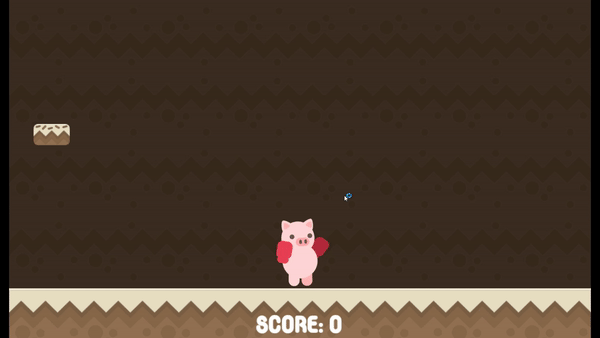Intro
I'm in for the #1GAM and currently I already made 2 games in a row, Bard's Lesson and No Diet for Good Pigs (release April's 5th), but I already did another game within a month, but wasn't #1GAM related, Moon Cheeser.
Moon Cheeser

Bard's Lesson

No Diet for Good Pigs

Why I took the challenge?
Many game developers has the dream to make a masterpiece and then engage in the industry from there to another project, and so on and so forth. But I have the dream to make an ever growing game studio with the main goal being entertaining the more players as possible. But I funded Pigdev Studio with an even more ambitious mission:
Pigdev Studio will provide free games, as in freedom, to help build a freer game industry
In this sense, every game, including all its assets are open source and free to use, no strings attached. But what does it have to do with #1GAM?
The Business Model
This mindset led me to try a bunch of business models until I reach the current one, which I call Recurrent Entertaining Content the idea consists in creating entertainment in a regular basis for our player, which will be able to play the games without any initial barriers. And for this, I'm studying new process both for design and production of games, using the time spam of one month to test and improve the studio's techniques.
After releasing a game each month (releases happen on Month's 5th) the game will then be available for play, but its development isn't finished. Player's will be able to report issues using GitHub issue tracking tools. Bugs and fixes are made asap, since they are due to our mistakes.
But, since the game repository is also open, both players and other professionals will be able to participate in further improvements, there are many ways to participate, for instance a common player can:
- Suggesting new features
- Reporting bugs and glitches
- Suggest more inclusive approaches or feedbacks
It also depends on the skills of the players, since the project will be open, and under MIT license, players, designers, artists and engineers (programmers) will be able to fork the project and make their own version, with their own approach, contents, etc... They can even try to make money with their version, again, no strings attached. But here we have an even more interesting insight. You can try to make your version, or a piece of it, CANON by asking a Pull Request in the official repository, so maybe your storyline becomes official, or maybe your character or boss or enemy enters in the official game version.
But until now there is nothing related to actual business, right?
How will the studio survive?
Since we are actual human beings and we thankfully live in a pseudocapitalist society, this model has to be profitable, right? Otherwise it would mean it isn't valuable for anyone, or at least the value people give to it doesn't pay the costs. Well I designed two fronts for incomes:
- Recurrent Content will be funded through PATRONAGE, where patrons can participate in the design and development process of the upcoming games.
- Development Cycles would be done to fund the implementation of new features and chapter of available games, using itch.io's Bundles and Sale's Goal features, with stretching goals more content and different medias will be available for the games (wallpapers, OSTs, posters, etc...)
The second part will be used to implement, improve and push the game's roadmap to the next release. These cycles will happen until the game reaches a level of quality at or beyond the quality demanded by Steam players, where the game will then be sold with a full price, of course people engaged in the process above will have access to it in forehand.
Feedback wanted
So I would like to know from you, which are the scenarios which this business model can go either wrong or well, and how sustainable can it be? Does it have potential? Since our studio stands hardly against Intellectual Property, this is the best model, after 2 years, I could design so that our studio doesn't rely on these laws. This is due to both, philosophical and financial reasons.

